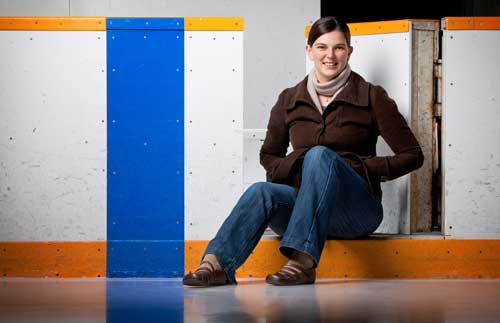Dr. Carly Adams joined the Department of Kinesiology and Physical Education in July 2007. Adams is a social and cultural historian working at the intersections of sport history and sport sociology. Her research interests lie in the study of 20th century Canadian sport, gender, regional and local history, oral history and women's sport governance. She is particularly drawn to research methods that allow her to talk to people about their sport and leisure experiences of the past and ask them how they make sense of and remember their experiences within the context of their lives and the world around them.
Most recently, Adams has received funding (with Dr. Hart Cantelon) through the Social Sciences and Humanities Research Council of Canada Sport Participation Research Initiative to explore issues of community revitalization and rural survival in southern Alberta through a case study of the Warner Hockey School in Warner, Alta. This project looks at the social determinants that led to the establishment of the school, its purposes, both imagined and actual, and the underlying role that high performance sport might play in rural community survival. She will present her findings at a Women Scholars Speaker Series event on Mar. 25, 12 to 2 p.m. in Andy's Place (AH100).
Adams received her PhD in Sport History at The University of Western Ontario in 2007. A paper from her dissertation won the North American Society for Sport History Graduate Student Essay Award.

What first piqued your interest in your research discipline?
I have always loved history and learning about the past. During my undergraduate studies in human kinetics and sport management at the University of Windsor, several influential professors piqued my interest in social history, oral history and the relevance of sport, leisure and recreation to our understanding of the past. However, I was also surprised by how few sport historians researched and wrote about gender and women's sport/recreation experiences. In 2000, I was chosen to participate in a one-semester exchange to Deakin University in Melbourne, Australia. While in Melbourne I interned with the Melbourne Football Club. The Aussie club had a full time sport historian on staff dedicated to the team – and from there I was hooked! I attended my first North American Society for Sport History conference in 2001 and discovered that there was a group of scholars dedicated to this type of research and I knew that this is what I wanted to do. My PhD dissertation project was largely based on oral histories with women who played industrial, recreational and playground sports in London, Ont. during the 1920s, 30s and 40s. As soon as I completed my first oral history interview, I knew how important memory and voice were going to be to how I wanted to "do" history.
How is your research applicable in "the real world"?
A historical understanding is relevant to all of us – past practices in any situation are valuable and important. It doesn't matter what career one is in, understanding experiences and happenings of the past will guide, shape and challenge how we think about the present and make decisions about the future. I have been fortunate to collaborate with various public institutions such as sports halls of fame and I have also recently published a book, aimed at ages 12 and up, about the Preston Rivulettes, a women's hockey team that competed in the 1930s. I am committed to disseminating my research beyond the borders of academia.
What is the greatest honour you have received in your career?
Every time I have an article accepted for publication, or I am asked to consult with a public institution (for example the Alberta Sports Hall of Fame and The National Commemoration Board of Parks Canada), or receive a research grant – it is an honour.
How important are students to your research endeavours?
Students are central to my research. I have had many student research assistants work closely with me on various projects. I also believe it is very important that we bring our research to the classroom. My greatest challenge as an educator is to encourage students to think critically about the world around them, to ask questions and express different perspectives. I use many examples from my research in class and encourage students to discuss and critically engage with the projects I am working on. Some of my favourite teaching moments have been listening to students discuss and challenge something I've written or offer a different perspective that challenges me to rethink the direction of a project.
If you had unlimited funds, which areas of research would you invest?
If I had unlimited funds, I would invest in ALL areas of research! Related to my own field, I would invest in regional, local and oral history in rural communities. These histories tend not to get much academic attention, and we risk forgetting these important ties to our past.
Each month, the Legend will present 5 Questions With . . . one of our researchers. For a look at the entire catalog of 5 Questions With . . . features, check out the Office of Research and Innovation Services website at www.uleth.ca/research_profiles. If you'd like to be profiled, contact Penny Pickles at pickpj@uleth.ca
This story first appeared in the March 2013 edition of the Legend. For a look at the full issue in a flipbook format, follow this link.
